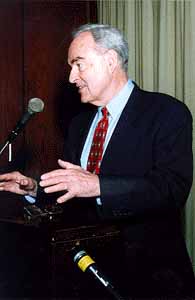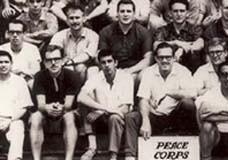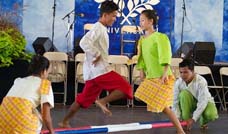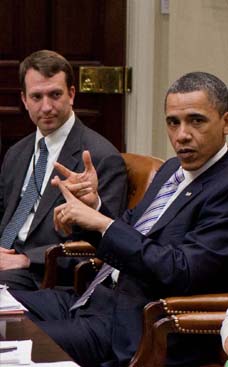
"You on this Committee face very difficult urgent budget choices. The urgent is often the enemy of the important, but in this case the important and the urgent come together. Most of us from the "training school" of the Peace Corps hope that this country and that the Congress and the President will find the way to get on the track to double the Peace Corps. After 9/11 President George Bush asked for that. In his presidential campaign, Barack Obama repeatedly called for that doubling of the Corps and in a message to the National Peace Corps Association called for the renewal of President Kennedy's hope for 100,000 a year."
Testimony of Harris Wofford: "Peace Corps: The Next Fifty Years"
Testimony of Harris Wofford
For the Senate Foreign Relations Subcommittee on Western Hemisphere, Peace Corps and Narcotic Affairs – October 6, 2011
Chairman Menendez and Ranking Member Rubio,
Thank you for inviting me here today to join Senator Dodd and our other colleagues and to talk about the Peace Corps, The Next 50Years, and in particular to give my historical perspective of the Peace Corps – the vision behind its establishment, my assessment of the Corps' strengths and weaknesses, and the importance of international volunteer service.
The celebration of the Peace Corps' 50th anniversary began for many of us last October 14th, at the University of Michigan , when hundreds of former Peace Corps Volunteers and staff and current students at the University and former students from the 1960 night we were celebrating assembled after midnight outside the student union. We were there, on a cold, drizzling night, to mark the time and place that presidential candidate John Kennedy struck the spark that led to the establishment of the Peace Corps four and a half months later. Kennedy was late in arriving, nearly 2 a.m., but found thousands waiting on a cold fall night and decided to make some impromptu remarks. Fifty years later, we heard and saw on a big screen Kennedy's extemporaneous threeminute talk. He asked, "How many of you who are going to be doctors, are willing to spend your days in Ghana?" and asked how many technicians and engineers are willing to serve around the world. "On your willingness to do that, not merely to serve one or two years in the service, but on your willingness to contribute part of your life to this country will depend the answer whether a free society can compete. I think . . .Americans are willing to contribute. But the effort must be far greater than we have ever made in the past." He ended with a challenge: "This university is not maintained. . . merely to help its graduates have an economic advantage in the life struggle. There is certainly a greater purpose."
There was loud applause and cheers that night in 1960, but almost no mention of Kennedy's call to serve in the news media. However a small group of students quickly formed an organization, Michigan Students Committed to World Responsibility, and drafted and began circulating a pledge saying they were willing "to apply their knowledge through direct participation in the under developed communities of the world."
Back at the Kennedy campaign headquarter Sargent Shriver and I knew nothing about all this until the mother of one of the students, Mildred Jeffrey, who was a leader in our campaign civil rights section, called to say nearly a thousand sudents had signed the pledge and they wanted help in arranging time when they could present it to Kennedy. When Kennedy was told about this response, before he even saw the pledges, according to Ted Sorensen, he said he wanted to propose an overseas volunteer program in one of his last major campaign talks. At the Cow Palace in San Francisco in the last days of the campaign, to widespread press coverage and a subsequent wave of enthusiasm on college campuses, he described and promised to create a Peace Corps. While watching the Inaugural parade, January 20, 1961, Kennedy asked Sargent Shriver to recommend how to create such a Peace Corps. I was lucky, as a campaign deputy to Shriver, to help him gather the task force that for five weeks, day and night, prepared the plan for launching the Peace Corps. The three goals were set – to help other countries meet there needs for development, to help people in those countries better understand America, and for Americans to better understand other people. Volunteers would serve for two years, plus training. They would be of all adult ages, but the signs were that most would be recent college graduates.
Within a few days of receiving the report, the President, on March 1, by executive order, established the Peace Corps, and simultaneously sent a message to Congress asking for legislation to authorize and appropriate funds to support it. Meanwhile with discretionary funds in the State Department budget, the President enabled Shriver to enlist a staff, recruit and select Volunteers, and send the first Volunteers forth, landing in Ghana before the end of August. There were several hundred Volunteers in the first countries by the time Congress passed the Peace Corps Act on September 22. It is hard to imagine all that happening today, all by executive order and in a few months Congressional action with large bi-partisan support..
In the next two years, while serving as Special Assistant to President Kennedy I was on call to help Shriver, including the first three-week trip with him to meet the heads of state in three continents, to see if they wanted Peace Corps Volunteers: they did. In the first country, Kwame Nkrumah, the President of newly independent Ghana, invited the Peace Corps to help meet Ghana's urgent need for teachers, and, you might be interested to know, he then asked if American schools would welcome some graduates of the University of Ghana to come and teach African history in our schools. Shriver enthusiastically said Yes, and as the outgoing president of the School Board of Chicago assured them a warm welcome in that city's schools. Nkrumah was gone and Lyndon Johnson was President before the idea of reciprocity was tried and a small-scale, successful pilot of Volunteers to America was started – which you might want to put on the list of unfinished business.
So that is a little history of the Peace Corps' creation, with this comment. Often in public work, especially when politics seems stalled as it did to many in 1960, especially young people, there's a tendency to give up. The crucial role of students in the Corps' creation, beginning with a small group who were determined to act, reminds us that there are times when idea and fate meet in a creative hour. Sargent Shriver repeatedly wrote and said that if those Michigan students had not taken the initiative and got nearly a thousand to sign the pledge saying they were willing to serve there is no reason to think that in the pressures of the transition and the crises that followed the Inauguration Kennedy the Peace Corps idea would have emerged as a priority.
Sargent Shriver's name, for those who built the Peace Corps in the 1960s became a verb: to "Shriverize" meant to be bolder, faster, make it big. Shriver believed that a small Peace Corps and one that was developed slowly would doom it to be mainly seen as a symbolic government public relations effort. When a professional aid expert in the State Department advised that it would take two years or maybe more, he went out telling us we were going to get 600 Volunteers in six months in six countries – and I think we did. Shriver aimed to make the Peace Corps the most anti-bureaucratic bureaucracy in government history.
Kennedy liked that spirit, and kept asking us for speed. In August 1962, I briefed the President before he went out to the White House lawn to send off some 600 Volunteers, including 300 going to teach in Ethiopia where I was soon to become the country director and the Peace Corps' special representative to Africa for the next two years. Walking back to the Oval Office, Kennedy conveyed his delight that the Peace Corps was proving itself and said, "This will be really serious when it's 100,000 volunteers going overseas each year and then there will be a million Americans who have had first-hand experience in Asia, Africa and Latin America. Then for the first time we'll have a large constituency for a good foreign policy."
The Peace Corps is now sending a little more than 8,000 Volunteers a year, and if the President's budget request is cut back substantially, that number will decrease and no new countries will have their wish for Peace Corps Volunteers fulfilled. In fifty years only 200,000 have served, not the several million Kennedy would have hoped for by now. When Shriver and I left the Peace Corps in late 1966 there were 16,000 Volunteers overseas or in training, and the plan was soon to reach 25,000. At President Johnson's request, in 1965 Vice President Humphrey and the Peace Corps Advisory Council convened a conference of a thousand of the first 3,000 Volunteers who came to Washington for three days to discuss the future of America as Citizens in a Time of Change. The President called the Peace Corps "a world-wide training school for Great Citizens." Vice President Humphrey told them: "By 1970 we hope there will be about 50,000 back here in the United States."
Two weeks ago some 5,000 Returned Volunteers and staff came to Washington for four days of celebrations, conferences, and country reunions on the Peace Corps' fiftieth. On Sunday we marched down from John and Robert Kennedy's graves at Arlington Cemetery, across Memorial Bridge to the Lincoln memorial. The sun came out for the long colorful line of marchers carrying the flags of the 139 countries in which they had served. Many of us also remembered the high hopes and the potential that was lost by the drain of resources for the Vietnam War. By the early 1970s the Corps was down to just a little over 5,000 a year. It was painful to think of that lost opportunity for Americans to make a far larger contribution to mutual understanding and economic and educational development – and to peace.
You on this Committee face very difficult urgent budget choices. The urgent is often the enemy of the important, but in this case the important and the urgent come together. Most of us from the "training school" of the Peace Corps hope that this country and that the Congress and the President will find the way to get on the track to double the Peace Corps. After 9/11 President George Bush asked for that. In his presidential campaign, Barack Obama repeatedly called for that doubling of the Corps and in a message to the National Peace Corps Association called for the renewal of President Kennedy's hope for 100,000 a year.
The Peace Corps and other forms of international service are as important today as they were in 1960 when Kennedy said the "effort must be far greater than we have ever made."
The National Peace Corps Association, whose president, Kevin Quigley is a witness today, and Civic Enterprises, headed by John Bridgeland, President George W. Bush's assistant for citizen service and the White House USA Freedom Corps director, have just released a report, "A Call to Peace: Perspectives of Volunteers on the Peace Corps at 50). It includes a comprehensive survey of a representative sample of Volunteers from all five decades conducted by Peter D. Hart Research Associates. The survey asked the Volunteers to answer some of the questions are asking about what the Peace Corps does well, what its challenges were and are, and is the vision for the future. Kevin Quigley will be putting that report in the hearing record and discussing it in his testimony. He, John Bridgeland, Jessica Milano of Civic Enterprises and I are the authors. We think you will find it informative and of value in assessing the Corps' strengths and weaknesses, and we'll be happy to talk with you or your staff after you or they have a chance to read it.
I want to put in the record a different kind of report that I find of great value, by the Gerald R. Ford School of Public Policy at the University of Michigan, sponsored by the Brookings Institution Initiative on International Volunteering and Service and the National Peace Corps Association, with support from the Building Bridges Coalition. Entitled PEACE CORPS: Charting the Future of International Service. It gives well edited excerpts from many of the talks given during the University's commemoration of the Peace Corps last October at the National Symposium on the Future of International Service in Ann Arbor. Dean Susan M. Collins of the Gerald Ford School opened with "A Greater Purpose" and President Mary Sue Coleman, President of the University of Michigan closed with "To Become Better Citizens of the World". There are further thoughts by two of the witnesses to come, Kevin Quigley and the Director of the Peace Corps Aaron Williams.
My talk was entitled "Time to Be Inventive Again." Those are the watch words for the next fifty years on which I will end for now. For the Peace Corps, it truly is time to be inventive again. Thank you.
















